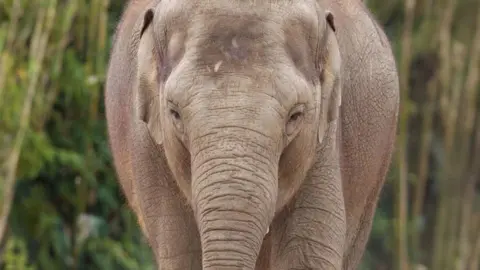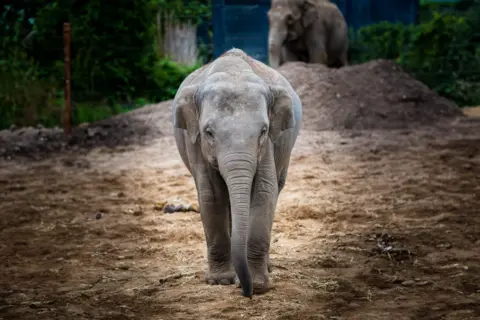Second elephant dies from virus at Dublin Zoo
 Dublin Zoo
Dublin ZooA second young elephant has died from an often deadly virus at Dublin Zoo.
In a statement, the zoo said the elephant died due to Elephant Endotheliotropic Herpesvirus (EEHV).
The virus - which attacks membranes, rapidly causing fever and bleeding - has a mortality rate of up to 85%.
Almost all Asian elephants carry the virus, but it only develops into an illness for some and there is no vaccination against it.
It does not pose a health risk to humans.
In a statement, the zoo said it was "heartbroken to announce the passing of Zinda, our beloved seven-year-old elephant, on 7 July".
It follows the recent death of another elephant, Avani, on 1 July, infected with the same virus.
What is elephant endotheliotrophic herpes virus?
 Dublin Zoo
Dublin ZooRelatively little is known about EEHV, which affects both wild and captive Asian elephants.
The virus often lies latent in elephants and can be triggered without warning, as it is carried asymptomatically.
EEHV was discovered in 1990 and formally characterised in 1999 by researchers at the Smithsonian Zoo in Washington DC.
They linked 10 cases of a "highly fatal haemorrhagic disease" in young Asian and African elephants in zoos.
In each case, they found "herpes virus-like particles" in cells of dead elephants' hearts, livers and tongues.
Since then, the virus has ripped through elephants populations in zoos. It has caused more than half of the deaths of Asian elephants in European and North American zoos over the last four decades.
It has now been detected in sanctuaries, safari parks and, more worryingly, in wild elephant herds in nine countries, including in India, Nepal and Myanmar.
'Unprecedented effort'
In an "unprecedented effort" to save Zinda, Dublin Zoo said both the Irish and UK governments faciliated the urgent importation of blood products and other essential supplies from Chester Zoo.
"We fervently hoped this would have helped save Zinda’s life. We are profoundly grateful to Chester Zoo for their unwavering support during this critical time," Dublin Zoo said.
Chester Zoo has lost numerous elephants to EEHV and, with scientists at the University of Surrey, is embarking on a world first - a trial of a potentially life-saving vaccine.
"Despite receiving round the clock care from our dedicated veterinary team and international experts, Zinda's condition deteriorated," Dublin Zoo said.
"EEHV is an unpredictable and fatal virus affecting young elephants both in the wild and under human care," it added.
The zoo also thanked An Garda Síochána (Irish police force), who escorted the blood products from Dublin Port to the zoo.
Dublin Zoo has enacted its EEHV response plan and is consulting with leading international experts in elephant health, virology and wildlife management.
"Currently, the other elephants in our herd are not showing signs of EEHV, but we are closely monitoring their health," the zoo said.
"The quick progression of the virus in Zinda underscores the challenges of managing this disease, even with the highest standards of care and vigilance."
The zoo added its commitment to the wellbeing of its elephants "remains steadfast" and it will "continue to take all necessary measures to ensure their safety".
